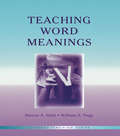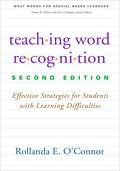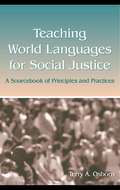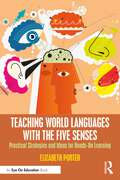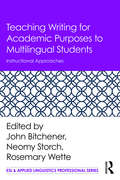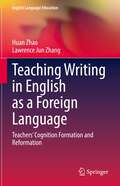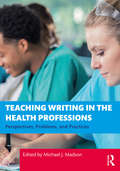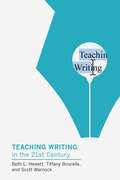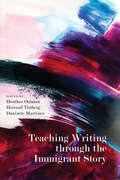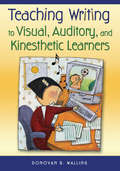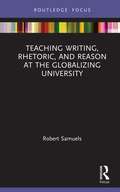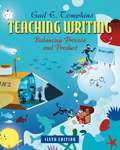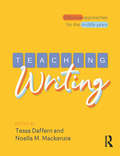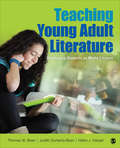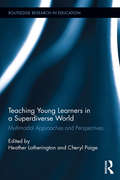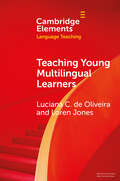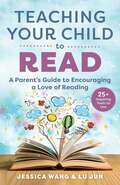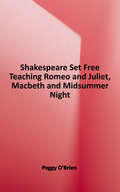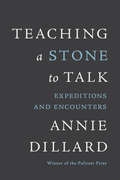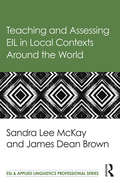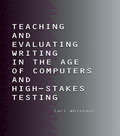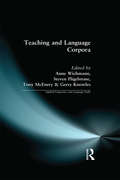- Table View
- List View
Teaching Word Meanings (Literacy Teaching Series)
by Steven A. Stahl William E. NagyLearning new words is foundational to success in school and life. Researchers have known for years that how many word meanings a student knows is one of the strongest predictors of how well that student will understand text and be able to communicate through writing. This book is about how children learn the meanings of new words (and the concepts they convey) and how teachers can be strategic in deciding which words to teach, how to teach them, and which words not to teach at all.This book offers a comprehensive approach to vocabulary instruction. It offers not just practical classroom activities for teaching words (though plenty of those are included), but ways that teachers can make the entire curriculum more effective at promoting students' vocabulary growth. It covers the 'why to' and 'when to' as well as the 'how to' of teaching word meanings.Key features of this exciting new book include:*A variety of vocabulary activities. Activities for teaching different kinds of words such as high frequency words, high utility words, and new concepts, are explained and illustrated.*Guidelines for choosing words. A chart provides a simple framework built around seven basic categories of words that helps teachers decide which words to teach and how to teach them.*Word learning strategies. Strategies are offered that will help students use context, word parts, and dictionaries more effectively.*Developing Word Consciousness. Although specific vocabulary instruction is fully covered, the primary goal of this book is to develop students' independent interest in words and their motivation to learn them.*Integrated Vocabulary Instruction. Teachers are encouraged to improve the reading vocabularies of their students by looking for opportunities to integrate vocabulary learning into activities that are undertaken for other purposes.
Teaching Word Recognition, Second Edition: Effective Strategies for Students with Learning Difficulties (What Works for Special-Needs Learners)
by Rollanda E. O'ConnorThis highly regarded teacher resource synthesizes the research base on word recognition and translates it into step-by-step instructional strategies, with special attention to students who are struggling. Chapters follow the stages through which students progress as they work toward skilled reading of words. Presented are practical, evidence-based techniques and activities that target letter- sound pairings, decoding and blending, sight words, multisyllabic words, and fluency. Ideal for use in primary-grade classrooms, the book also offers specific guidance for working with older children who are having difficulties. Reproducible assessment tools and word lists can be downloaded and printed in a convenient 8 1/2" x 11" size. New to This Edition *Incorporates the latest research on word recognition and its connections to vocabulary, reading fluency, and comprehension. *Chapter on morphological (meaning-based) instruction. *Chapter on English language learners. *Instructive "Try This" activities at the end of each chapter for teacher study groups and professional development.
Teaching World Epics (Options for Teaching)
by Jo Ann CavalloCultures across the globe have embraced epics: stories of memorable deeds by heroic characters whose actions have significant consequences for their lives and their communities. Incorporating narrative elements also found in sacred history, chronicle, saga, legend, romance, myth, folklore, and the novel, epics throughout history have both animated the imagination and encouraged reflection on what it means to be human. Teaching World Epics addresses ancient and more recent epic works from Africa, Europe, Mesoamerica, and East, Central, and South Asia that are available in English translations.Useful to instructors of literature, peace and conflict studies, transnational studies, women's studies, and religious studies, the essays in this volume focus on epics in sociopolitical and cultural contexts, on the adaptation and reception of epic works, and on themes that are especially relevant today, such as gender dynamics and politics, national identity, colonialism and imperialism, violence, and war.This volume includes discussion of Ludovico Ariosto's Orlando Furioso, Giulia Bigolina's Urania, The Book of Dede Korkut, Luís Vaz de Camões's Os Lusíadas, David of Sassoun, The Epic of Askia Mohammed, The Epic of Gilgamesh, the epic of Sun-Jata, Alonso de Ercilla y Zúñiga's La Araucana, Homer's Iliad and Odyssey, Kalevala, Kebra Nagast, Kudrun, The Legend of Poṉṉivaḷa Nadu, the Mahabharata, Manas, John Milton's Paradise Lost, Mwindo, the Nibelungenlied, Poema de mio Cid, Popol Wuj, the Ramayana, the Shahnameh, Sirat Bani Hilal, Edmund Spenser's The Faerie Queene, Statius's Thebaid, The Tale of the Heike, Three Kingdoms, Gaspar Pérez de Villagrá's Historia de la Nueva México, and Virgil's Aeneid.
Teaching World Languages for Social Justice: A Sourcebook of Principles and Practices
by Terry A. OsbornTeaching World Languages for Social Justice: A Sourcebook of Principles and Practices offers principles based on theory, and innovative concepts, approaches, and practices illustrated through concrete examples, for promoting social justice and developing a critical praxis in foreign language classrooms in the U.S. and in wider world language communities. For educators seeking to translate these ideals into classroom practice in an environment dominated by the current standards movement and accountability measures, the critical insights on language education offered in this text will be widely welcomed.The text is designed as a sourcebook for translating theory into practice. Each chapter includes the theoretical base, guidelines for practice, discussion of the relationship to existing practices in the world language classroom, suggestions for activity development (which can be integrated into a professional portfolio), illustrative examples, questions for reflection, and additional suggested readings.Teaching World Languages for Social Justice is a primary or supplementary text for second and foreign language teaching methods courses and is equally appropriate for graduate courses in language education or educational studies.
Teaching World Languages with the Five Senses: Practical Strategies and Ideas for Hands-On Learning
by Elizabeth PorterWith this fun, practical guide, you will have everything you need to re-envision and reinvigorate your world language classroom. Author Elizabeth Porter draws on a brain-based approach to show how language learning is a sensory experience. Students can effectively learn languages and improve retention through activities and lessons that incorporate the five senses – sight, hearing, taste, touch, and smell. Chapters include real-world, research-backed examples and classroom strategies and activities ready for use. An essential resource for world language teachers, this book introduces language learning philosophy and an out-of-the-box, effective approach that uses neuroscience combined with best practices to promote a highly engaging language learning environment.
Teaching World Languages with the Five Senses: Practical Strategies and Ideas for Hands-On Learning
by Elizabeth PorterWith this fun, practical guide, you will have everything you need to re-envision and reinvigorate your world language classroom. Author Elizabeth Porter draws on a brain-based approach to show how language learning is a sensory experience. Students can effectively learn languages and improve retention through activities and lessons that incorporate the five senses – sight, hearing, taste, touch, and smell. Chapters include real-world, research-backed examples and classroom strategies and activities ready for use. An essential resource for world language teachers, this book introduces language learning philosophy and an out-of-the-box, effective approach that uses neuroscience combined with best practices to promote a highly engaging language learning environment.
Teaching Writing for Academic Purposes to Multilingual Students: Instructional Approaches (ESL & Applied Linguistics Professional Series)
by Neomy Storch John Bitchener Rosemary WetteExamining what is involved in learning to write for academic purposes from a variety of perspectives, this book focuses in particular on issues related to academic writing instruction in diverse contexts, both geographical and disciplinary. Informed by current theory and research, leading experts in the field explain and illustrate instructional programs, tasks, and activities that help L2/multilingual writers develop knowledge of different genres, disciplinary expectations, and expertise in applying what they have learned in both educational and professional contexts.
Teaching Writing in English as a Foreign Language: Teachers’ Cognition Formation and Reformation (English Language Education #28)
by Lawrence Jun Zhang Huan ZhaoThis book explores teachers’ cognitions about the teaching of writing in English as a foreign language (EFL) and their teaching practice, as well as factors influencing the formation and reformation process of their cognition. Taking stock of Bakhtin’s dialogism as the theoretical framework, the authors argue that the formation and reformation of teacher cognition is a dialogic process. A systematic analysis of participating teachers’ cognition formation and re-formation process suggests the highly individual nature of teachers’ cognitions. EFL researchers and teachers, teacher educators, teacher education policymakers, university administrators and EFL textbook writers could draw on the findings of the study to provide better resources to implement the teaching of EFL writing more effectively. The study has adopted a mixed-methods approach, whose quantitative results show the patterns and differences of teacher cognition among teachers of different backgrounds and with different schooling, education and working experiences. The qualitative findings show in detail teachers' cognition formation and reformation processes and the factors contributing to such processes, revealing convergence and divergence of teachers’ stated cognitions, with a focus on the discrepancy between teacher cognition and teaching practice. These are useful lenses through which researchers and teachers will find significant implications for offering EFL writing instruction more effectively.
Teaching Writing in the Health Professions: Perspectives, Problems, and Practices
by Michael J. MadsonThis collection provides a research-based guide to instructional practices for writing in the health professions, promoting faculty development and bringing together perspectives from writing studies, technical communication, and health humanities. With employment in health-care sectors booming, writing instruction tailored for the health professions is in high demand. Writing instruction is critical in the health professions because health professionals, current and aspiring, need to communicate persuasively with patients, peers, mentors, and others. Writing instruction can also help cultivate professional identity, reflective practice, empathy, critical thinking, confidence, and organization, as well as research skills. This collection prepares faculty and administrators to meet this demand. It combines conceptual development of writing for the health professions as an emergent interdiscipline with evidence-based practices for instructors in academic, clinical, and community settings. Teaching Writing in the Health Professions is an essential resource for instructors, scholars, and program administrators in health disciplines, professional and technical communication, health humanities, and interdisciplinary writing studies. It informs the teaching of writing in programs in medicine, nursing, pharmacy and allied health, public health, and other related professions.
Teaching Writing in the Twenty-First Century
by Beth L. Hewett Tiffany Bourelle Scott WarnockTeaching Writing in the Twenty-First Century is a comprehensive introduction to writing instruction in an increasingly digital world. It provides both a theoretical background and detailed practical guidance to writing instructors faced with novel and ever-changing digital learning technologies, new approaches to access needs and usability design, increasing student diversity, and the multiliteracies of reading, alphabetic writing, and multimodal composition. A companion volume, Administering Writing Programs in the Twenty-First Century, considers the role of administrators in addressing these issues.Covering all aspects of teaching online, various composition genres, and the technologies available to teachers, Teaching Writing in the Twenty-First Century addresses composing processes and approaches; designing and scaffolding assignments; providing response, feedback, and evaluation; communicating effectively; and supporting students. These strategic and practical ideas are prefaced by a history of the relation between composition and rhetoric and a guide to diversity, inclusion, and access. The volume ends with a chapter on envisioning the future of composition.
Teaching Writing through the Immigrant Story
by Howard Tinberg Heather Ostman Danizete MartínezTeaching Writing through the Immigrant Story explores the intersection between immigration and pedagogy via the narrative form. Embedded in the contexts of both student writing and student reading of literature chapters by scholars from four-year and two-year colleges and universities across the country, this book engages the topic of immigration within writing and literature courses as the site for extending, critiquing, and challenging assumptions about justice and equity while deepening students’ sense of ethics and humanity. Each of the chapters recognizes the prevalence of immigrant students in writing classrooms across the United States—including foreign-born, first- and second-generation Americans, and more—and the myriad opportunities and challenges those students present to their instructors. These contributors have seen the validity in the stories and experiences these students bring to the classroom—evidence of their lifetimes of complex learning in both academic and nonacademic settings. Like thousands of college-level instructors in the United States, they have immigrant stories of their own. The immigrant “narrative” offers a unique framework for knowledge production in which students and teachers may learn from each other, in which the ordinary power dynamic of teacher and students begins to shift, to enable empathy to emerge and to provide space for an authentic kind of pedagogy. By engaging writing and literature teachers within and outside the classroom, Teaching Writing through the Immigrant Story speaks to the immigrant narrative as a viable frame for teaching writing—an opportunity for building and articulating knowledge through academic discourse. The book creates a platform for immigration as a writing and literary theme, a framework for critical thinking, and a foundation for significant social change and advocacy. Contributors: Tuli Chatterji, Katie Daily, Libby Garland, Silvia Giagnoni, Sibylle Gruber, John Havard, Timothy Henderson, Brennan Herring, Lilian Mina, Rachel Pate, Emily Schnee, Elizabeth Stone
Teaching Writing to Visual, Auditory, and Kinesthetic Learners
by Donovan R. WallingThis resource offers differentiated teaching techniques and sample lessons for writing and thinking skills that emphasize fluency, artistry, walkabout strategies, pattern and rhythm, and more!
Teaching Writing, Rhetoric, and Reason at the Globalizing University (Routledge Research in Writing Studies)
by Robert SamuelsThis timely intervention into composition studies presents a case for the need to teach all students a shared system of communication and logic based on the modern globalizing ideals of universality, neutrality, and empiricism. Based on a series of close readings of contemporary writing by Stanley Fish, Asao Inoue, Doug Downs and Elizabeth Wardle, Richard Rorty, Slavoj Zizek, and Steven Pinker, this book critiques recent arguments that traditional approaches to teaching writing, grammar, and argumentation foster marginalization, oppression, and the restriction of student agency. Instead, it argues that the best way to educate and empower a diverse global student body is to promote a mode of academic discourse dedicated to the impartial judgment of empirical facts communicated in an open and clear manner. It provides a critical analysis of core topics in composition studies, including the teaching of grammar; notions of objectivity and neutrality; empiricism and pragmatism; identity politics; and postmodernism. Aimed at graduate students and junior instructors in rhetoric and composition, as well as more seasoned scholars and program administrators, this polemical book provides an accessible staging of key debates that all writing instructors must grapple with.
Teaching Writing: Balancing Process and Product (Sixth Edition)
by Gail E. TompkinsThis best selling text by Gail Tompkins thoroughly examines genres and instructional procedures with a strong new focus on differentiating instruction to ensure success for all writing students. New chapters on the writer's craft and on writing across the curriculum offer detailed information on the six traits of good writing as well as writing in content areas, and new features provide insight into teaching English learners and using technology meaningfully in the writing classroom.
Teaching Writing: Effective approaches for the middle years
by Tessa DaffernIn the 21st century, writing is more important than at any other time in human history. Yet much of the emphasis in schooling has been on reading, and after the early years, writing skills have been given less attention. Internationally, too many children are leaving school without the writing skills they need to succeed in life. The evidence indicates that students rarely develop proficiency as writers without effective teacher instruction. Teaching Writing offers a comprehensive approach for the middle years of schooling, when the groundwork should be laid for the demanding writing tasks of senior school and the workplace. Teaching Writing outlines evidence-based principles of writing instruction for upper primary students and young adolescents. It presents strategies that are ready for adoption or adaptation, and exemplars to assist with designing and implementing writing lessons across the middle years of school. It addresses writing from a multimodal perspective while also highlighting the importance of teaching linguistic aspects of text design such as sentence structure, vocabulary and spelling as foundations for meaning-making. Contributors argue that students need to continue to develop their skills in both handwriting and keyboarding. Examples of the teaching of writing across disciplines are presented through a range of vignettes. Strategies for assessing student writing and for supporting students with diverse needs are also explored. With contributions from leading literacy educators, Teaching Writing is an invaluable resource for primary, secondary and pre-service teachers.
Teaching Young Adult Literature (Options for Teaching #50)
by Mike Cadden, Karen Coats, and Roberta Seelinger TritesThanks to the success of franchises such as The Hunger Games and Twilight, young adult literature has reached a new level of prominence and popularity. Teens and adults alike are drawn to the genre's coming-of-age themes, fast pacing, and vivid emotional portrayals. The essays in this volume suggest ways high school and college instructors can incorporate YA texts into courses in literature, education, library science, and general education.The first group of essays explores key issues in YA literature, situates works in cultural contexts, and addresses questions of text selection and censorship. The second section discusses a range of genres within YA literature, including both realistic and speculative fiction as well as verse narratives, comics, and film. The final section offers ideas for assignments, including interdisciplinary and digital projects, in a variety of courses.
Teaching Young Adult Literature: Developing Students as World Citizens
by Thomas W. Bean Judithann Dunkerly-Bean Helen J. HarperTeaching Young Adult Literature: Developing Students As World Citizens (by Thomas W. Bean, Judith Dunkerly-Bean, and Helen Harper) is a middle and secondary school methods text that introduces pre-service teachers in teacher credential programs and in-service teachers pursuing a Masters degree in Education to the field of young adult literature for use in contemporary contexts. The text introduces teachers to current research on adolescent life and literacy; the new and expanding genres of young adult literature; teaching approaches and practical strategies for using young adult literature in English and Language Arts secondary classrooms and in Content Area Subjects (e.g. History); and ongoing social, political and pedagogical issues of English and Language Arts classrooms in relation to contemporary young adult literature.
Teaching Young Learners in a Superdiverse World: Multimodal Approaches and Perspectives (Routledge Research in Education #190)
by Heather Lotherington Cheryl PaigeThis book documents a collaborative action research project in one school where researchers and practitioners worked together to develop multimodal literacies and pedagogies for diverse, multilingual elementary classrooms. Following chronologically from Lotherington’s Pedagogy of Multiliteracies (2011), this volume picks up after teachers and researchers have learned how to work efficiently as a learning community to offer project-based learning approaches. This edited collection relates how teachers and students of different grade levels, language backgrounds, and abilities developed a shared agenda and created a framework for effective and inclusive practices. Contributors demonstrate that collaboration, creative pedagogical solutions and innovative project-based learning are all essential parts of learning and teaching socially appropriate and responsive literacies in a multimodal, superdiverse world.
Teaching Young Multilingual Learners: Key Issues and New Insights (Elements in Language Teaching)
by Loren Jones Luciana C. OliveiraThis Element provides an overview of research focusing on language teaching practices for young multilingual learners in primary classrooms in English-speaking contexts. The term 'young multilingual learner' refers to primary school children, with ages ranging from approximately 5 to 12 years old at various English language proficiency levels. Pedagogy-informed research studies conducted in K-5 classrooms are used to develop research-informed pedagogies for young multilingual learners in primary classrooms. The authors use the notion of culturally sustaining teaching practices to provide examples from pedagogy-informed research studies. The focus on early (K-3) and intermediate (4-5) grades provides a range of illustrations of such practices. The Element concludes with implications for teacher education and the preparation of teachers of young multilingual learners.
Teaching Your Child to Read: A Parent's Guide to Encouraging a Love of Reading
by Jessica Wang Lu JunIs your young child often disinterested in the books you bring home for them? Do you wish they would develop a love for reading that they could take into middle school and beyond? Some children love reading, requesting the same books over and over again and giggling with delight each time, while others simply despise sitting down for story time. What makes the difference in these two types of children? No child is born knowing how to read, so where does their interest come from? How do you encourage it? Like eating and drinking, reading is a daily necessity for every child. Parents should consciously guide and conform to their children&’s interest in reading with appropriate reading materials whenever possible. Books should take priority over watching television and playing video games. Professional and systematic training can help children start to love reading, maintain good reading habits, and improve their reading ability.Teaching Your Child to Read is a guide book for parents looking to get their children, ages 3 to 6, interested in reading. It explains how to help children cultivate reading ability step by step, as well as answers the questions of Why should I? and How do I? when it comes to specific exercises. Tools parents will learn to use in their efforts include:interval questioningobject comparingemotional contrastingplot mappingand more!
Teaching a Midsummer Night's Dream, Romeo and Juliet, and Macbeth: Shakespeare Set Free (Folger Shakespeare Library)
by Peggy O'BrienThe Folger Shakespeare Library, the nation's most important center for Shakespeare study and scholarship, is also the center for Shakespeare education. At the Library's Teaching Shakespeare Institute, scholars, actors, and teachers from across the country work together in the business of teaching and learning Shakespeare. This volume of the Shakespeare Set Free series is written by institute faculty and participants and includes the latest developments in recent scholarship. It bristles with the energy created by teaching and learning Shakespeare from the text and through active performance and reflects the experience, wisdom, and wit of real classroom teachers in schools and colleges throughout the United States. In this book, you will find the following:-Clearly written essays by leading scholars to refresh teachers and challenge older students -Michael Tolaydo’s brilliant and accessible technique for classroom teaching through performance -Day-by-day teaching strategies that successfully and energetically immerse students in every grade and skill level in the language and the plays themselves – created, taught, and written by real teachers.
Teaching a Stone to Talk
by Annie DillardHere, in this compelling assembly of writings, Pulitzer Prize-winning author Annie Dillard explores the world of natural facts and human meanings.
Teaching and Assessing EIL in Local Contexts Around the World (ESL & Applied Linguistics Professional Series)
by Sandra Lee Mckay James Dean BrownEnglish today is a global language embedded in a great variety of social contexts, resulting in linguistic and pedagogical variation. Taking a new look at the teaching and assessing of English as an international language (EIL), this text highlights overarching principles and provides specific strategies for responding to questions and challenges posed by the changing demographics of English language learners and users around the world. Teaching and Assessment in EIL Classrooms introduces an original, coherent framework in which needs analysis, pedagogical principles, and assessment are integrated describes variables that influence effective teaching and assessment and the characteristics of various EIL teachers and learners emphasizes that pedagogical and assessment decisions need to be based on the learning and teaching needs of each specific EIL context includes specific principles and strategies for teaching and assessing grammar, oral language, and literacy skills in EIL classrooms provides strategies for integrating computer-mediated language into EIL classrooms in ways that promote cross-cultural awareness, language development, and individualized learning Timely, accessible, and practical, this text for graduate and pre- and in-service courses on language teaching and assessment is at the forefront in providing valuable information and guidance for enabling principled and context-sensitive praxis in EIL classrooms worldwide.
Teaching and Evaluating Writing in the Age of Computers and High-Stakes Testing
by Carl WhithausThis book takes on a daunting task: How do writing teachers continue to work toward preparing students for academic and real-world communication situations, while faced with the increasing use of standardized high-stakes testing? Teachers need both the technical ability to deal with this reality and the ideological means to critique the information technologies and assessment methods that are transforming the writing classroom.Teaching and Evaluating Writing in the Age of Computers and High-Stakes Testing serves this dual need by offering a theoretical framework, actual case studies, and practical methods for evaluating student writing. By examining issues in writing assessment--ranging from the development of electronic portfolios to the impact of state-wide, standards-based assessment methods on secondary and post-secondary courses--this book discovers four situated techniques of authentic assessment that are already in use at a number of locales throughout the United States. These techniques stress:*interacting with students as communicators using synchronous and asynchronous environments;*describing the processes and products of student learning rather than enumerating deficits;*situating pedagogy and evaluation within systems that incorporate rather than exclude local variables; and*distributing assessment among diverse audiences.By advocating for a flexible system of communication-based assessment in computer-mediated writing instruction, this book validates teachers' and students' experiences with writing and also acknowledges the real-world weight of the new writing components on the SAT and ACT, as well as on state-mandated standardized writing and proficiency exams.
Teaching and Language Corpora: Papers From The Third International Conference On Teaching And Language Corpora (Applied Linguistics and Language Study #Vol. 2)
by Anne Wichmann Steven FligelstoneCorpora are well-established as a resource for language research; they are now also increasingly being used for teaching purposes. This book is the first of its kind to deal explicitly and in a wide-ranging way with the use of corpora in teaching. It contains an extensive collection of articles by corpus linguists and practising teachers, covering not only the use of data to inform and create teaching materials but also the direct exploitation of corpora by students, both in the study of linguistics in general and in the acquisition of proficiency in individual languages, including English, Welsh, German, French and Italian. In addition, the book offers practical information on the sources of corpora and concordances, including those suitable for work on non-roman scripts such as Greek and Cyrillic.
